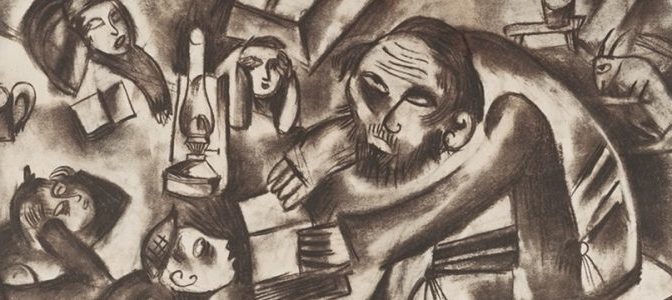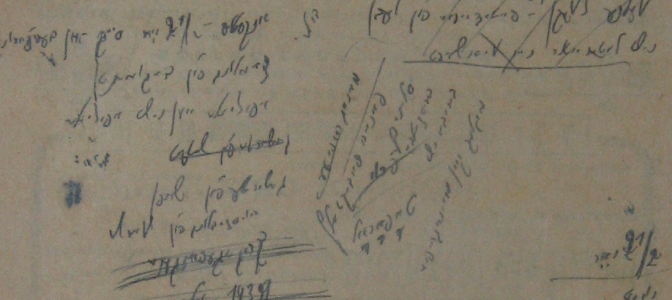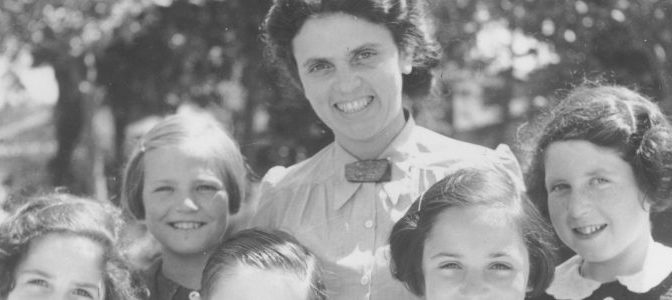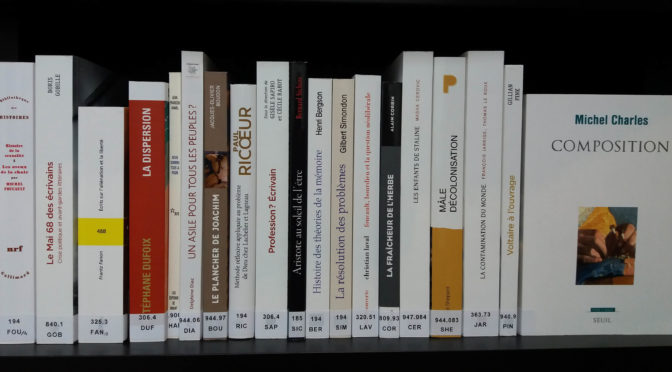The fifth session of IMS / CEFRES epistemological seminar of this year will be hosted by
Anna Simbartlová (IMS FSV UK)
Topic: Civic Integration
Where: CEFRES Library – Na Florenci 3, Prague 1
When: Wednesday 20 February 2019 from 4:30 pm to 6 pm
Language: English
Text:
- Sara Wallace Goodman (2010) Integration Requirements for Integration’s Sake? Identifying, Categorising and Comparing Civic Integration Policies, Journal of Ethnic and Migration Studies, 36:5, 753–772,

A lecture by Carmen Reichert (Augsburg University) in the frame of the seminar on Modern Jewish History of the Institute of Contemporary History (AV ČR) and CEFRES in partnership with the Masaryk Institute (AV ČR).
Where: CEFRES library, Na Florenci 3, 110 00 Prague 1
When: from 5:30 pm to 7:00 pm
Language: English
Abstract
Narrations on the Choice of Yiddish in Autobiographical Writings after Peretz
It should come as no surprise that literary autobiographies essentially tell us how writers became writers. From Rousseau’s Confessions to Goethe’s Bildungsroman – lire and écrire – an author’s reading lists and their first attempts at writing are crucial topoi to the genre. But the Yiddish writers of the early twentieth century did not grow up with the knowledge that their mother tongue was a literary language. Hebrew and not Yiddish was the language of learning in private schools for Jewish boys. This is why Yiddish writing in the early twentieth-century developed somewhere between the traditional, Hebrew-dominated education system of Cheders and Yeshivas and non-Jewish libraries. According to tradition, written Yiddish texts were primarily intended for women and uneducated men. Therefore, male and female writers developed different writing strategies when writing Yiddish: Whereas women could trace their writings back to early Yiddish autobiographies such as Glikl of Hameln’s “Zikhroynes” (Memories), men preferred to follow Western European traditions. Yiddish autobiographies often link the personal lives of their writers to the history of Yiddish. For example, when Sholem Aleichem compares his life to the market (“yarid”), he simultaneously commits his voice to the “market language” of Yiddish. I. L. Peretz, the “father” of the Yiddish literature, was particularly influential in this context. Not only did he encourage writers to switch to their native language, his autobiography “Mayne zikhroynes” (My Memoirs), which draws inspiration from Romanticism, inspired a great number of autobiographical texts from younger writers.
Carmen Reichert is a postdoctoral researcher at the Augsburg University currently working on a project about literature and language debates in context of the Czernowitz language conference. For more, please see here.

A lecture by Joanna Nalewajko-Kulikov (Tadeusz Manteuffel Institute of History, Polish Academy of Sciences) in the frame of the seminar on Modern Jewish History of the Institute of Contemporary History (AV ČR) and CEFRES in partnership with the Masaryk Institute (AV ČR).
Where: CEFRES library, Na Florenci 3, 110 00 Prague 1
When: from 5:30 pm to 7:00 pm
Language: English
Abstract
In September 1939 a Polish-Jewish historian, teacher and social activist Emanuel Ringelblum (1900–1944) began taking notes on various aspects of wartime reality, an activity he continued until January 1943. It was the beginning of a wider documenting project, later known under the codename of “Oneg Shabbat” or the Underground Archive of the Warsaw Ghetto. They were unearthed after the war and are now held in the Jewish Historical Institute Archive in Warsaw. A small part is located in Hersh Wasser Collection, YIVO Institute for Jewish Research in New York.
Ringelblum’s notes were published in the original language (Yiddish) in Warsaw in 1952 (Notitsn fun varshever geto), 1961–1963 (Ksovim fun geto) and in Tel Aviv in 1985 (reprint of the 1961–1963 edition including notes from the Hersh Wasser Collection). The Polish translation was prepared by Adam Rutkowski in the late 1950s, but was withdrawn from the printing house following the antisemitic campaign of 1968. It finally came out in 1983, edited by Artur Eisenbach, under the title Kronika getta warszawskiego.
In my lecture I would like to share some of my experiences from preparing a new, critical and completed edition (Pisma Emanuela Ringelbluma z getta, ed. Joanna Nalewajko-Kulikov, transl. Agata Kondrat [et al.], Warszawa 2018, series „Archiwum Ringelbluma. Konspiracyjne Archiwum Getta Warszawy”, vol. 29). I will show the differences between the new edition and the previous ones and will discuss problems that arise upon editing a source which reached us as an unfinished draft which was never intended to be published in this form.
Joanna Nalewajko-Kulikov is Associate Professor at the Tadeusz Manteuffel Institute of History of the Polish Academy of Sciences. Her research focuses on the history of East European Jewry in the 19th and 20th century, history of Yiddish culture (especially Yiddish daily press) and Polish-Jewish relations. Her books include, among others, Obywatel Jidyszlandu. Rzecz o zydowskich komunistach w Polsce (2009; English translation forthcoming 2019) and Mowic we wlasnym imieniu. Prasa jidyszowa a tworzenie zydowskiej tozsamosci narodowej (2016). For the publishing series “Archiwum Ringelbluma” she edited memoirs of Tsvi Prylucki (2015) and Emanuel Ringelblum’s notes from the Warsaw ghetto (2018). She is currently working on a book-length project devoted to Yiddish press in interwar Poland.

A lecture by Laura Hobson Faure (Université Sorbonne Nouvelle – Paris 3) in the frame of the seminar on Modern Jewish History of the Institute of Contemporary History (AV ČR) and CEFRES in partnership with the Masaryk Institute (AV ČR).
Where: CEFRES library, Na Florenci 3, 110 00 Prague 1
When: from 5:30 pm to 7:00 pm
Language: English
Abstract
Since the 1990s, historians have sought to incorporate Jewish children’s experiences into the historiography on the Holocaust (Dwork, 1991, Stargardt, 2006), seeking out child-produced sources to write child-centered histories. Childhood as a sub-field of Holocaust studies has continued to develop, and now includes works on Jewish children’s experiences in Occupied Europe, as well as in the countries to which they fled (Michlic 2017, Gigliotti and Tempian, 2016, Cohen 2018, Ouzan 2018). However, historians have often constructed their work within local or national frameworks, remaining staunchly attached to a narrow periodization, focusing either on the war years or the postwar period. My current research, on a small group of about 300 children who fled from Central Europe to France in 1938-39, and from France to the United States in 1941-42, proposes a new reading of this history by considering children’s lives in transnational perspective, over a period of time that includes both the Holocaust and its long aftermath. By following the process through which children became refugees, I will shed light on little known child-evacuation schemes, but also question how these children, as adults, shaped the rise of contemporary Holocaust memory, as Holocaust survivors. This project thus proposes a microhistory of children’s networks, with the hope of raising larger questions of how individuals and families responded to persecution collectively, how social work practices and organizations shaped children’s lives, and how former child victims shaped the rise of Holocaust memory in Western Democracies.
Fourth session of IMS / CEFRES epistemological seminar of this semester led by
Pavel Baloun (FHS UK / CEFRES)
Martin Pjecha (CEU / CEFRES)
Topic: “Violences”, Old and New
Where: CEFRES Library – Na Florenci 3, Prague 1
When: Wednesday 5 December 2018 from 4:30 pm to 6 pm
Language: English
Texts:
- Zygmunt Bauman: Modernity and the Holocaust, Polity Press, Cambridge 1989: 46-72.

The new edition of CEFRES Review of Books will take place on Thursday 13 December at 5 pm at CEFRES library.
Join us for a discussion around the latest publications in humanities and social sciences from France.
This informal meeting gathers CEFRES team, the library readers, and professionals from libraries and publishing. The aim of our Review of Books is to make better known the publishing landscape in humanities and social sciences. Each book is presented in no more than 10 minutes, so to stress its originality and stakes.
So far, the following presentations are announced : Continue reading CEFRES Review of Books – December 2018 →




